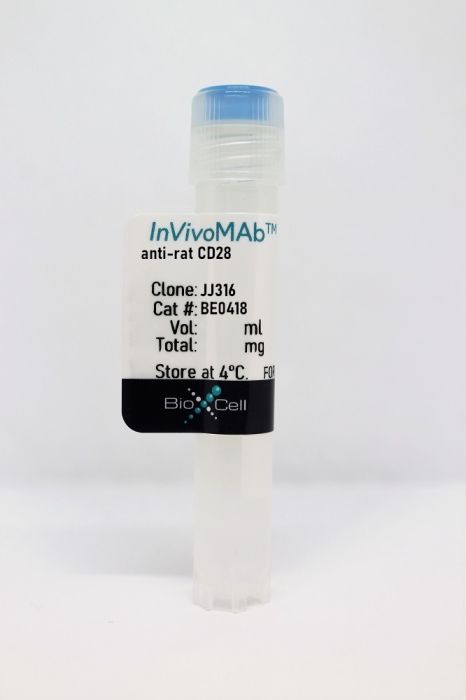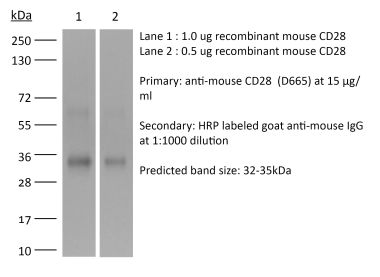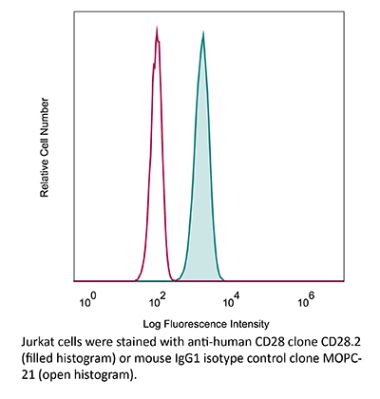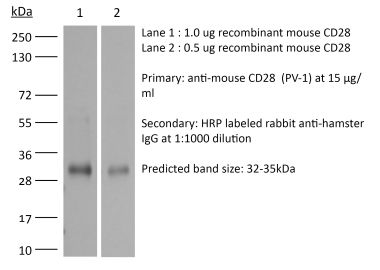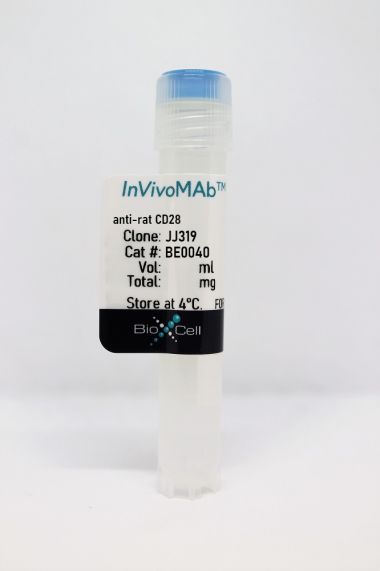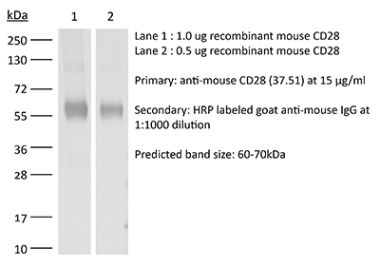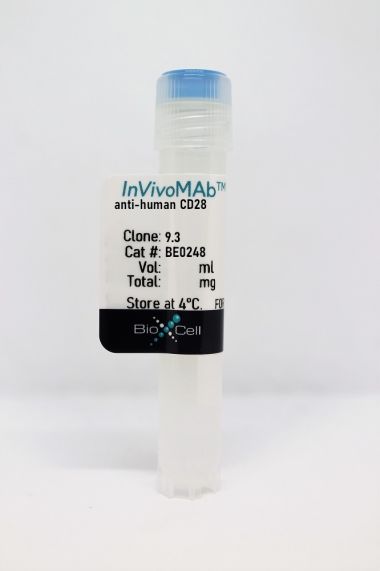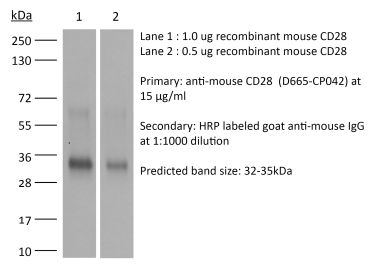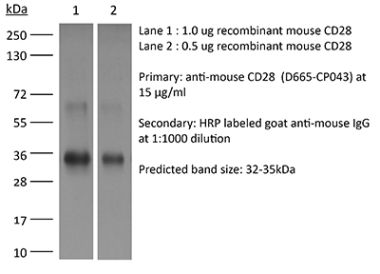InVivoMAb anti-rat CD28
Product Details
The JJ316 monoclonal antibody reacts with rat CD28, a 45 kDa costimulatory receptor and a member of the Ig superfamily. CD28 is expressed by thymocytes, most peripheral T cells, and NK cells. CD28 is a receptor for CD80 (B7-1) and CD86 (B7-2). Signaling through CD28 augments IL-2 and IL-2 receptor expression as well as cytotoxicity of CD3-activated T cells. In contrast to JJ319 which is a “conventional” CD28-specific Mab that costimulates anti-TCR-triggered proliferation in vitro, JJ316 is a CD28 “superagonistic” antibody that induces polyclonal T cell proliferation in vitro and in vivo and does not require TCR ligation.Specifications
| Isotype | Mouse IgG1, κ |
|---|---|
| Recommended Isotype Control(s) | InVivoMAb mouse IgG1 isotype control, unknown specificity |
| Recommended Dilution Buffer | InVivoPure pH 7.0 Dilution Buffer |
| Conjugation | This product is unconjugated. Conjugation is available via our Antibody Conjugation Services. |
| Immunogen | Rat CD28-transfected BALB/c mouse A2OJ cell line |
| Reported Applications | in vivo T cell stimulation/activation |
| Formulation |
PBS, pH 7.0 Contains no stabilizers or preservatives |
| Endotoxin |
<2EU/mg (<0.002EU/μg) Determined by LAL gel clotting assay |
| Purity |
>95% Determined by SDS-PAGE |
| Sterility | 0.2 µm filtration |
| Production | Purified from cell culture supernatant in an animal-free facility |
| Purification | Protein G |
| Molecular Weight | 150 kDa |
| Storage | The antibody solution should be stored at the stock concentration at 4°C. Do not freeze. |
Recommended Products
in vivo T cell stimulation/activation
Takabatake Y, Li XK, Mizui M, Miyasato K, Matsui I, Kawada N, Imai E, Hünig T, Takahara S, Wada T, Furuichi K, Rakugi H, Isaka Y. (2011). "A superagonistic monoclonal antibody for CD28 ameliorates crescentic glomerulonephritis in wistar-kyoto rats" Mol Med 17(7-8):686-96. PubMed
Regulatory T (Treg) cells play an important role in the resolution of crescentic glomerulonephritis, where a T helper 1 (Th1)-predominant immune response promotes crescent formation. Therefore, agents that increase Treg cells appear to be ideal for suppressing T-cell-mediated renal pathology. We hypothesized that a superagonistic monoclonal antibody for CD28 (JJ316), which has been known to preferentially expand Treg cells in vivo, could prevent nephrotoxic serum-induced nephritis in Wistar-Kyoto rats, one of the experimental models of crescentic glomerulonephritis. Administration of JJ316 attenuated crescent formation, proteinuria and glomerular accumulation of macrophages and CD8(+) T cells. These changes were accompanied by increased infiltration of Treg cells. Among glomerular macrophages, the CD163(+) subset was significantly increased after treatment, suggesting that Treg cells may modulate the phenotype of macrophages leading to resolution of glomerulonephritis. In an adoptive transfer experiment, two T-cell subsets (CD4(+)CD25(+) and CD4(+)CD25(-) T cells) purified from spleens and lymph nodes of donor rats primed with JJ316 3 d before were inoculated into nephritic recipient rats, which recapitulated the beneficial effects of in vivo administration of JJ316. Furthermore, a single injection of JJ316 administered 3 d after disease induction completely protected nephritic rats from death for 2 months. In conclusion, we demonstrated that treatment with JJ316 has a dramatic therapeutic effect on an experimental crescentic glomerulonephritis, possibly due to expansion and activation of Treg cells.
in vivo T cell stimulation/activation
Wang S, Liu J, Wang M, Zhang J, Wang Z. (2010). "Treatment and prevention of experimental autoimmune myocarditis with CD28 superagonists" Cardiology 115(2):107-13. PubMed
Experimental autoimmune myocarditis (EAM), a rodent model of human dilated cardiomyopathy (DCM), is mediated by an autoimmune mechanism. We investigated whether a CD28 superagonistic antibody selectively targeting CD4+CD25+ regulatory T cells (T(regs)) provides effective therapy for EAM.
in vivo T cell stimulation/activation
Müller N, van den Brandt J, Odoardi F, Tischner D, Herath J, Flügel A, Reichardt HM. (2008). "A CD28 superagonistic antibody elicits 2 functionally distinct waves of T cell activation in rats" J Clin Invest 118(4):1405-16. PubMed
Administration of the CD28 superagonistic antibody JJ316 is an efficient means to treat autoimmune diseases in rats, but the humanized antibody TGN1412 caused devastating side effects in healthy volunteers during a clinical trial. Here we show that JJ316 treatment of rats induced a dramatic redistribution of T lymphocytes from the periphery to the secondary lymphoid organs, resulting in severe T lymphopenia. Live imaging of secondary lymphoid organs revealed that JJ316 administration almost instantaneously (<2 minutes) arrested T cells in situ. This reduction in T cell motility was accompanied by profound cytoskeletal rearrangements and increased cell size. In addition, surface expression of lymphocyte function-associated antigen-1 was enhanced, endothelial differentiation sphingolipid G protein-coupled receptor 1 and L selectin levels were downregulated, and the cells lost their responsiveness to sphingosine 1-phosphate-directed migration. These proadhesive alterations were accompanied by signs of strong activation, including upregulation of CD25, CD69, CD134, and proinflammatory mediators. However, this did not lead to a cytokine storm similar to the clinical trial. While most of the early changes disappeared within 48 hours, we observed that CD4+CD25+FoxP3+ regulatory T cells experienced a second phase of activation, which resulted in massive cell enlargement, extensive polarization, and increased motility. These data suggest that CD28 superagonists elicit 2 qualitatively distinct waves of activation.
in vivo T cell stimulation/activation
Rodríguez-Palmero M, Franch A, Castell M, Pelegrí C, Pérez-Cano FJ, Kleinschnitz C, Stoll G, Hünig T, Castellote C. (2006). "Effective treatment of adjuvant arthritis with a stimulatory CD28-specific monoclonal antibody" J Rheumatol 33(1):110-8. PubMed
To determine the immunomodulatory effects of the anti-rat CD28 monoclonal antibody (Mab) JJ316 on the onset of rat adjuvant arthritis (AA). JJ316 is a superagonistic Mab that induces polyclonal T cell proliferation in the absence of T cell receptor (TCR) ligation and promotes the expansion of regulatory T cells.

